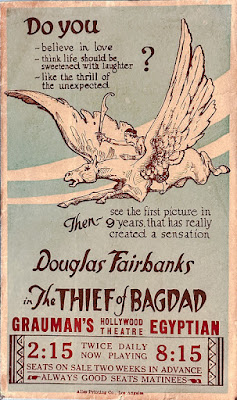First, a quick thank you to everyone who contributed to this site recently reaching the milestone of 1 million page views
I've been keeping this running log about my silent film accompaniment adventures for about 15 years now. It's been fun and I'll continue to do so.
It's mostly to get the word out about upcoming screenings, such as 'The Thief of Bagdad' (1924), which I'm accompanying on Saturday, June 8 in Brandon, Vt. (See below!)
But occasionally I share more in-depth thoughts about the craft of accompanying, the silent era, the films themselves, or other idiosyncratic topics.
It's an intermittent diary of sorts, a record that helps me remember and keep track of the experiences I've had so far.
Next up is a biggie: Douglas Fairbanks in 'The Thief of Bagdad,' which is celebrating its 100th anniversary this season.
I hope you'll join me up in Brandon, Vt. on Saturday, June 8 for a screening of this timeless motion picture fantasy. More info in the press release below!
* * *
Adventure/fantasy starring Douglas Fairbanks Sr. presented with live music in celebration of film's 100th anniversary
BRANDON, Vt.—It ranks among the first Hollywood epics to show the full potential for movies to depict entire worlds of fantasy. It was also one of the top grossing films of 1924.
'The Thief of Bagdad' stands among his best work. It's a timeless fable on a grand scale, boasting a great story, spectacular sets, and magical special effects.
A bare-chested Fairbanks plays a crafty street-smart rogue who can easily steal anything his heart desires—except the love of a beautiful princess, daughter of the powerful Caliph of Bagdad.
To win her hand, he must not only change his ways, but also show his worthiness over many other highly placed suitors.
In making the film, Fairbanks spared no expense for what some critics still regard as the most lavish fantasy movie ever made, a show-stopping adaptation of the traditional "A Thousand and One Nights" Arabian legend.
Fairbanks, swaggering through massive marketplace sets and cavernous throne rooms as an incorrigible pickpocket, scales towering walls (with the help of a magic rope) and leads merry chases through crowded bazaars in his pursuit of loot.
The jaunty opening is a preamble to the film's spectacular second half, in which the repentant thief embarks on an odyssey through caverns of fire, underwater palaces, and even outer space.
William Cameron Menzies's sets were among the largest ever created for a motion picture. Especially noteworthy is his design for a mythical Bagdad, a unique combination of Art Deco and Islamic elements—a dream city inspired by illustrations from story books.
Fairbanks, among the most popular stars of the 1920s, was the inspiration for the character of George Valentin in the Oscar-winning Best Picture 'The Artist' (2011).
A century after its premiere, 'The Thief of Bagdad' remains highly regarded. In 1996, the film was selected for preservation in the U.S. National Film Registry by the Library of Congress as being "culturally, historically, or aesthetically significant."
Live music for 'The Thief of Bagdad' will be provided by silent film accompanist Jeff Rapsis, who uses a digital synthesizer to create a traditional full orchestra "movie score" sound.
"Seeing a Fairbanks picture in a theater with live music and an audience is a classic movie experience," Rapsis said.
Rapsis emphasized the unique value of seeing early cinema as it was originally presented.
"These films were designed for the big screen, live music, and large audiences. If you put it all together again, you get a sense of why people first fell in love with the movies," Rapsis said.
The screening of 'The Thief of Bagdad' is sponsored by Kathy and Wayne Rausenberger, Donna Malewicki, Jean and Harold Somerset, Donald and Dolories Furnari, Gary and Nancy Meffe, and Pam and Steve Douglass.
Other films in this year's Brandon Town Hall silent film series include:
See Douglas FairbanksSr. in the 'The Thief of Bagdad' (1924) with live music on Saturday, June 8 at 7 p.m. at the Brandon Town Hall and Community Center, Route 7, in Brandon, Vt. All are welcome to this family-friendly event. Admission is free, with free will donations accepted in support of ongoing Town Hall renovations.















